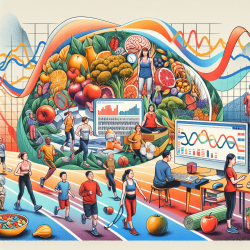Introduction
In the realm of special education and therapeutic services, staying informed about the latest research and its practical applications is crucial. A recent study titled The combined effect of physical activity and fruit and vegetable intake on decreasing cognitive decline in older Taiwanese adults offers valuable insights that can enhance the practice of professionals in this field. This blog post aims to explore the findings of this research and suggest ways practitioners can integrate these insights into their work.
Key Findings of the Study
The study, conducted over a 16-year period, investigated the impact of combining physical activity (PA) with fruit and vegetable (F&V) intake on cognitive decline among older Taiwanese adults. The research found that high levels of both PA and F&V intake significantly reduced the risk of cognitive decline by 63%. Independently, high PA was associated with a 60% reduction, and high F&V intake with a 40% reduction in cognitive decline.
Implementing Research Outcomes in Practice
For practitioners working with older adults or those in special education, these findings underscore the importance of promoting a holistic approach to health that includes both physical activity and nutrition. Here are some practical steps to implement these insights:
- Encourage Regular Physical Activity: Develop programs that incorporate moderate to high levels of physical activity tailored to the capabilities and interests of older adults. Activities such as walking, tai chi, or light aerobics can be effective.
- Promote Nutritional Education: Educate clients and their families about the benefits of a diet rich in fruits and vegetables. Provide resources or workshops on preparing healthy meals that are easy to incorporate into daily routines.
- Integrate Holistic Health Plans: Create individualized health plans that combine physical activity and dietary guidelines. Monitor progress and adjust plans as needed to ensure they meet the evolving needs of clients.
Encouraging Further Research
While this study provides compelling evidence of the benefits of combining PA and F&V intake, there is always room for further research. Practitioners are encouraged to explore the following areas:
- Investigate the specific types of physical activities and dietary patterns that yield the best cognitive outcomes.
- Examine the long-term adherence to combined PA and F&V intake interventions and their impact on cognitive health.
- Explore the cultural and socioeconomic factors that influence the effectiveness of these interventions in diverse populations.
Conclusion
The findings from the Taiwanese study highlight the significant impact that a combination of physical activity and a diet rich in fruits and vegetables can have on cognitive health. By implementing these insights, practitioners can enhance the quality of life for older adults and those with cognitive impairments. For a deeper understanding of the research, practitioners are encouraged to read the original study.
To read the original research paper, please follow this link: The combined effect of physical activity and fruit and vegetable intake on decreasing cognitive decline in older Taiwanese adults.










